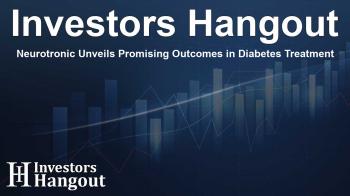Neurotronic Unveils Promising Outcomes in Diabetes Treatment

Neurotronic Introduces Breakthrough in Treating Diabetes
Neurotronic, Inc. has made significant strides in the medical field with its innovative approach to treating type 2 diabetes and hypertension through multi-organ denervation. The company recently presented the first clinical outcomes of its revolutionary Neuviant™ Multi-organ Denervation (MDN) technique at a prestigious medical conference. This method specifically targets complex cardiovascular and metabolic diseases that have become a major health concern globally.
Understanding the Study Design and Methodology
The company showcased findings from two notable trials, NECTAR III and NECTAR IV, conducted with patients suffering from both type 2 diabetes mellitus and hypertension—two of the most challenging chronic diseases faced today. These studies represented a pioneering effort to evaluate the safety and effectiveness of the Neuviant MDN System, which employs targeted therapies that focus on multiple overactive sympathetic pathways in the body.
The NECTAR Trials Explained
The NECTAR III and NECTAR IV studies enrolled patients who were struggling to control their diabetes and hypertension through existing medication. NECTAR III focused on patients with uncontrolled conditions, while NECTAR IV included participants who had both conditions inadequately managed. This dual approach allowed researchers to gather comprehensive data regarding the effectiveness of the Neuviant system.
Key Outcomes and Data Presentation
During the annual conference, the results were compellingly presented by eminent researchers. Professor Dr. Horst Sievert shared the NECTAR IV findings, while Dr. Ajay J. Kirtane covered the results of NECTAR III. Their presentations marked a groundbreaking moment in the cardiovascular community, reporting on the efficacy of multi-organ denervation as a viable treatment option.
Significant Safety and Effectiveness Results
The outcomes of the studies demonstrated promising results. In the NECTAR III trial, an impressive 97.4% of patients met the primary safety endpoint within the first 30 days. This marked a significant milestone, as the treatment was deemed well-tolerated, with only one reported complication that was effectively managed.
The therapy also showed notable success in reducing both blood sugar levels and blood pressure. Participants showed an average decrease in HbA1c and ambulatory blood pressure measurements, marking a substantial improvement in their health.
NECTAR IV Results Highlighted
Similarly, the NECTAR IV study demonstrated exceptional results, with 100% of patients meeting the procedural safety endpoints and 85% receiving the full treatment. Patients experienced significant reductions in HbA1c and blood pressure levels, showcasing the effectiveness of the Neuviant MDN method.
Looking Ahead: Future Implications
As the medical community eagerly anticipates the next phases of clinical trials, many believe that this innovative technique has the potential to transform treatment paradigms for patients grappling with type 2 diabetes and hypertension. Dr. Kirtane, who will lead future trials, emphasized the necessity of addressing these pressing health issues and the substantial impact neurologically targeted treatments might have.
Lixiao Wang, PhD, CEO of Neurotronic, Inc., expressed pride in leading the way in the advancing field of multi-organ denervation, underlining the urgent need for effective therapies in cardiometabolic diseases. The vision remains clear: to bridge the gap in treatment options for millions affected by these chronic conditions.
About Neurotronic, Inc.
Founded in 2015, Neurotronic is committed to pioneering advancements in treating complex cardiovascular and metabolic diseases, including type 2 diabetes and hypertension. Clinicians interested in learning more about the Neuviant MDN therapy and upcoming clinical trials are encouraged to reach out for more information.
Frequently Asked Questions
What is the Neuviant™ Multi-organ Denervation (MDN) System?
The Neuviant MDN System is an investigational therapy that uses catheter-delivered ethanol to disrupt overactive sympathetic nerve pathways, aimed at managing T2DM and hypertension.
What were the main findings of the NECTAR III and IV studies?
Both studies reported high safety and effectiveness rates, with significant reductions in HbA1c and blood pressure among participants receiving the Neuviant treatment.
Who led the presentations at the recent conference?
The results of the trials were presented by Professor Dr. Horst Sievert and Dr. Ajay J. Kirtane during the annual TCT conference.
What does the procedure involve?
The procedure involves delivering ethanol to the tissue surrounding the hepatic and renal arteries, targeting sympathetic nerve pathways to improve glucose and blood pressure regulation.
What are the future plans for Neurotronic's trials?
Neurotronic plans to initiate a U.S. pilot randomized controlled trial in the near future to further evaluate the Neuviant MDN therapy.
About The Author
Contact Caleb Price privately here. Or send an email with ATTN: Caleb Price as the subject to contact@investorshangout.com.
About Investors Hangout
Investors Hangout is a leading online stock forum for financial discussion and learning, offering a wide range of free tools and resources. It draws in traders of all levels, who exchange market knowledge, investigate trading tactics, and keep an eye on industry developments in real time. Featuring financial articles, stock message boards, quotes, charts, company profiles, and live news updates. Through cooperative learning and a wealth of informational resources, it helps users from novices creating their first portfolios to experts honing their techniques. Join Investors Hangout today: https://investorshangout.com/
The content of this article is based on factual, publicly available information and does not represent legal, financial, or investment advice. Investors Hangout does not offer financial advice, and the author is not a licensed financial advisor. Consult a qualified advisor before making any financial or investment decisions based on this article. This article should not be considered advice to purchase, sell, or hold any securities or other investments. If any of the material provided here is inaccurate, please contact us for corrections.

